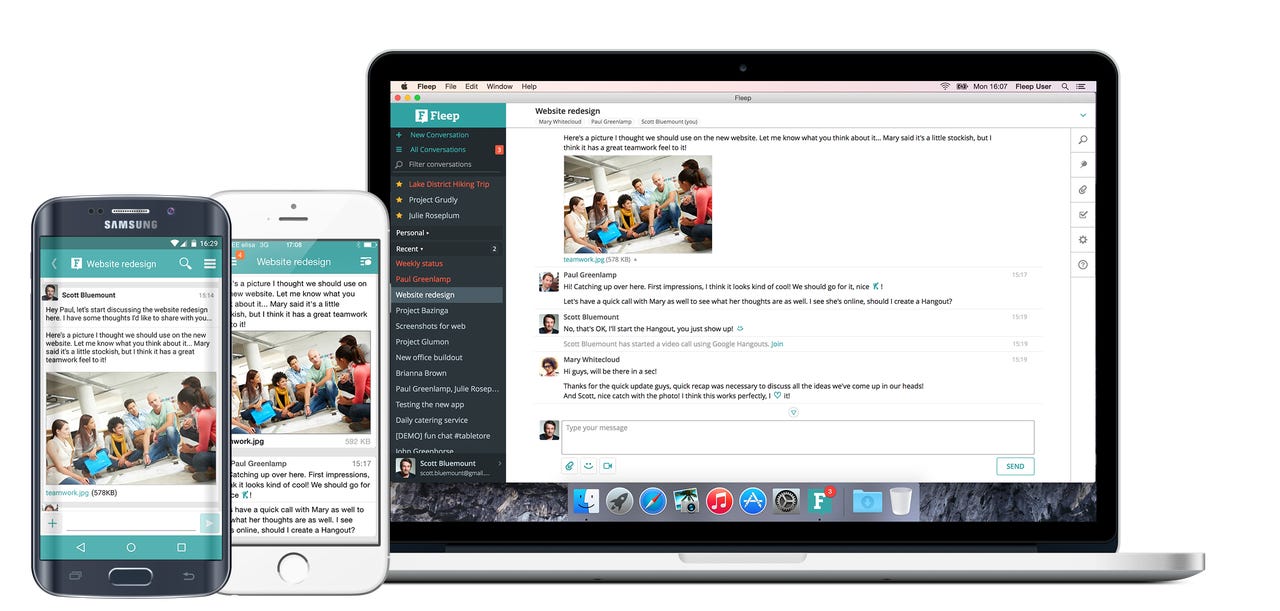'It's a 1970s protocol, we can do better': The ex-Skypers on a mission to replace email


The four believed there was a need for a group messaging app that could help business users collaborate better - so they built an app called Fleep that could do just that.
"People are using it for their conversations with their friends and family as well, but they start using it because they want to get their work done. A typical Fleep user today is an office worker who's part of one or a number of small teams that are geographically distributed - designers, software developers, architects, project managers," Henn Ruukel, CEO of Fleep Technologies, the company behind the Fleep app, told ZDNet.
Fleep is available for the web, as well as for Android, iOS, Mac, and Windows. Ruukel considers it part of the second wave of communication services that are sweeping away traditional tools.
"The text communications market is living in very interesting times. It started off with WhatsApp and others replacing SMS for the consumer/friends-and-family segment, and now there's a new wave of services that are going after business messaging, which is still dominated by email."
There are two major differences between Fleep and other business messenging services like Slack or HipChat, according to Ruukel.
"Fleep is a network, not a team internal tool. With Fleep, every user can communicate with each other, while other messaging apps are built around pre-defined teams where you can communicate only within that team."
As an experiment, the interview for this article was conducted via Fleep. "I'm responding to your questions in Fleep even though we work in different teams," Ruukel said. "We couldn't do this in Slack or HipChat."
Although Ruukel is convinced that email is going to lose its importance in the business world sooner rather than later, he's also sure that the only way to make that happen is by smoothing the transition path for users.
That's why Fleep integrates with email, rather than trying to exist alongside it. That way, users can include email participants into Fleep conversations, and messages and files can be sent to Fleep as normal email. Similarly, email users can include a Fleep user in an email thread using their email-compatible Fleep ID.
"Email was never built for conversations. I think communication between people will move over to Fleep or other modern messengers which are optimized for conversations and collaboration. Based on my own and other users' experience, it starts off with email being used in parallel [with Fleep] and eventually you notice that you haven't checked your email for few days, so it will gradually lose its importance," Ruukel said.
However, that doesn't mean that email will disappear overnight.
"It has its stronghold in one-way communication like newsletters and invoicing, and it also has become our de facto identity in other internet services. It will be used for those for a while," Ruukel added.
The transition from email to apps in the business world brings with it some significant changes in users' behaviour. People tend to see email as a professional tool and apps as non-formal ways of communicating, so there could well be changes to business communications etiquette as the corporate world moves away from email.
Ruukel doesn't see that as a necessarily a bad thing. "Using Fleep with email participants creates a crossroads between email and IM culture, but I think it leads to less formal and more useful exchange of thought, which leads to better agreements or decisions. One way to compare email with Fleep is to think of email like someone giving a speech and everyone else listening, while a Fleep conversation is very much like a real-life meeting with its topic, agenda, and members."
Positioning itself somewhere between email and instant messenger, one of the challenges for Fleep is dealing with all the spam that finds its way onto both platforms. In Ruukel's opinion, the main problem lies not in the spam itself, but in assigning levels of importance to incoming messages and those who send them.
"Traditionally all email senders get equal receiver attention. We are looking into ways to improve incoming email filtering in a way where emails from strangers would not get equal attention as email or Fleep messages from people you've been communicating with before. We like the idea that in order to get someone's attention, you need to find someone who would introduce you. We haven't nailed the details on this yet, but I think optimizing for receivers' attention is a way to go," he said.
Fleep's usability in networking is the reason why Lasse Nørby, project manager at VentureScout, who has being using the platform for some time, has grown fond of it.
"I first experienced Fleep on the Going Global program we were running in Estonia where one of the participating startups was Fleep. I instantly realised that it is an amazing tool to include and reach new collaborators outside of my own company - something other messaging services fail to do. This feature is amazingly valuable and makes introductions much more actionable and fast-paced - something I truly value," he told ZDNet.
Last year, Fleep introduced a freemium revenue model - premium users who pay €3 a month have unlimited access to history and files, while free users could only access messages from the last 30 days. Last month, the company decided to removed the 30-day limit for free users.
"The monetization model is always a difficult choice. We decided to go for a simple, fair, and transparent model, and the current conversion [rate] to Premium is what we expected to see."
Right now, Fleep is using an unorthodox strategy for a successful Estonian startup: the company is entirely based in Estonia, with the 16 employees split 50/50 between the capital city Tallinn and the university town of Tartu. Its biggest markets are the US, UK, India, Russia, and Australia - and Ruukel says that in the near term the focus will remain on these countries.
The app was built by Estonian ex-Skypers and it's also being funded by other Estonian ex-Skypers: in two funding rounds it has gathered over €500,000 of investments from Skype's Estonian co-founders Jaan Tallinn, Ahti Heinla, and Priit Kasesalu and from the company's former country manager Sten Tamkivi.
Tallinn, one of the main investors and also mentors, sees a bright future for Fleep.
"At Skype, the instant messenger function was always my baby - but because the company focused so much on voice and video, I felt it never got the attention it deserved. So when Henn and the other ex-Skypers came to me with a plan to really forge ahead with a next-generation messenger, I had confidence they were the right guys to do it."
He knows that the competition is tough, but he believes that Fleep's team is up to the job.
"Obviously it's a tough world out there for tech startups but the world is crying out for a modern platform that integrates with email and can be more effective for business communications. Email is a protocol from the 1970s - we can do better and Fleep could be the answer."
Read more from Estonia